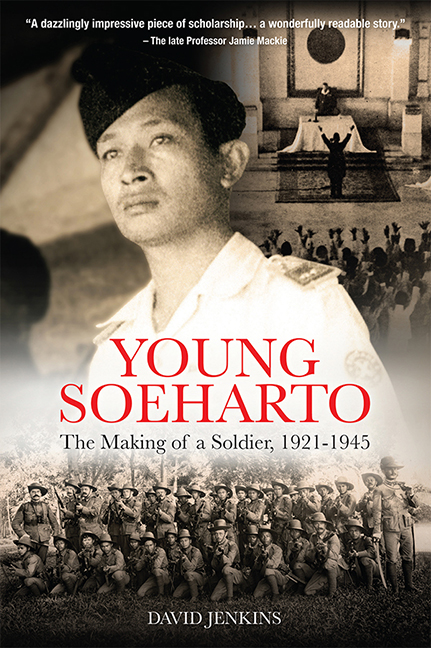Book contents
- Frontmatter
- Contents
- Foreword
- A Note on Spelling and Names
- A Note on Military Organization
- Maps
- List of Charts
- Preface
- Soeharto Family Tree
- 1 “The Sultan came to me and asked about that Family tree”
- 2 “The Cork on which the Netherlands Floats”
- 3 “They Regard Holland as a very Weak Power”
- 4 “An Invisible Motivating Force”
- 5 “What kind of Islam is this?”
- 6 “Soeharto is a Closed Book”
- 7 “I was Suited to the Disciplined life of the Military”
- 8 A Reassuringly Familiar World
- 9 A Policeman for the Japanese
- 10 An Armed Force Conjured out of Nothing
- 11 “The whole Island was Ablaze with Enthusiasm”
- 12 “Don’t make them too Strong!”
- 13 “Soeharto was a Cautious Man”
- 14 “Why did they Choose Soeharto?”
- Glossary and Abbreviations
- Notes
- Acknowledgements
- Bibliography
- Index
- About the Author
11 - “The whole Island was Ablaze with Enthusiasm”
Published online by Cambridge University Press: 09 October 2021
- Frontmatter
- Contents
- Foreword
- A Note on Spelling and Names
- A Note on Military Organization
- Maps
- List of Charts
- Preface
- Soeharto Family Tree
- 1 “The Sultan came to me and asked about that Family tree”
- 2 “The Cork on which the Netherlands Floats”
- 3 “They Regard Holland as a very Weak Power”
- 4 “An Invisible Motivating Force”
- 5 “What kind of Islam is this?”
- 6 “Soeharto is a Closed Book”
- 7 “I was Suited to the Disciplined life of the Military”
- 8 A Reassuringly Familiar World
- 9 A Policeman for the Japanese
- 10 An Armed Force Conjured out of Nothing
- 11 “The whole Island was Ablaze with Enthusiasm”
- 12 “Don’t make them too Strong!”
- 13 “Soeharto was a Cautious Man”
- 14 “Why did they Choose Soeharto?”
- Glossary and Abbreviations
- Notes
- Acknowledgements
- Bibliography
- Index
- About the Author
Summary
On Friday, 8 October 1943, on the advice of his Japanese superior, Superintendent Okamoto, Soeharto presented himself at a temporary army recruitment centre in Yogyakarta. Wearing a kain (sarong), white shirt and sandals, rather than his police uniform, he joined about four hundred other young men who gathered in the grounds of an elementary school in the heart of the city. The Sixteenth Army had decided to form a Java Volunteer Defence Force—which was to be known in Japanese as the Jawa Boei Giyugun, or Giyugun for short, and which the Indonesians would come to know as the Fatherland Volunteer Defence Force (Tentara Sukarela Pembela Tanah Air, or Peta)—to augment its own overstretched units. It was now looking for officer cadets. Soeharto may have been “advised” to be at the recruitment centre that day. But this, the evidence suggests, was an opportunity he welcomed. He had just the sort of capabilities the Japanese were looking for and recruitment into Peta would allow him to move on from police duties, which were presumably less to his liking than army life. Soeharto had set his heart on joining the volunteer defence force.
Some of the young, and not so young, Javanese men waiting to be interviewed that day had impressive credentials. They came from a middle-or upper-priyayi background and had attended Dutch high schools, some of them quite prestigious. These applicants were relatively healthy, well-fed and well-dressed. They included schoolteachers, policemen, public servants and high school students. Others who waited patiently in the sun were less well qualified for the positions on offer. Most were barefoot. Many were in poor health (the most common medical complaints were skin diseases and TB). Many had only the most rudimentary education. Inside the hall, where they were called in one at a time, a twenty-six-year-old Japanese intelligence officer, First Lieutenant Tsuchiya Kiso, the director (shibucho) of Beppan's Yogyakarta branch, sat at a table choosing officer cadets for the new force. Tsuchiya was responsible for recruiting battalion commanders, company commanders and platoon commanders.
In the weeks before this, Tsuchiya, continuing a process begun by Maruzaki, had asked several organizations in Yogyakarta to recommend suitable candidates.
- Type
- Chapter
- Information
- Young SoehartoThe Making of a Soldier, 1921–1945, pp. 221 - 236Publisher: ISEAS–Yusof Ishak InstitutePrint publication year: 2021

